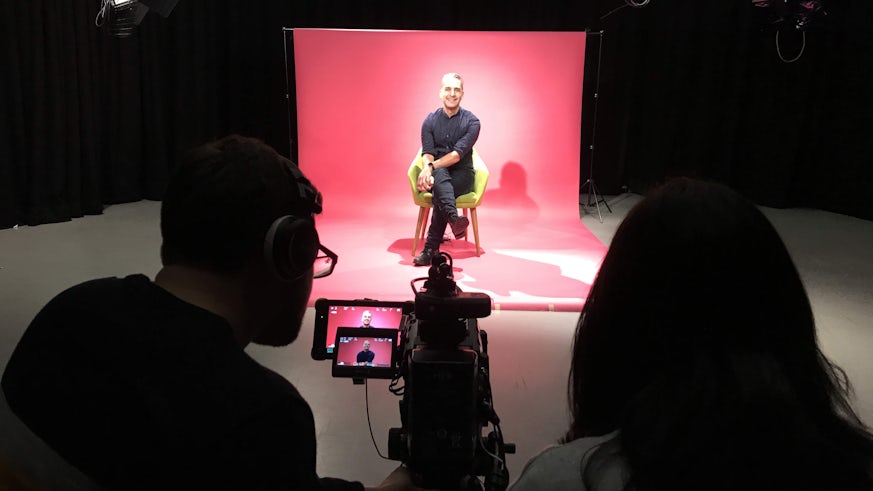Clwstwr celebrates success of creatives in South Wales
30 June 2022

A multi-million pound programme to drive innovation in the screen industries is celebrating the work of more than 100 projects which have benefitted.
Led by Cardiff University, in partnership with the University of South Wales and Cardiff Metropolitan University, Clwstwr is a research and development (R&D) programme which has supported freelancers, small businesses and larger organisations in South Wales to explore new ways of working and trial new products and services.
The project is part of the Creative Industries Clusters Programme, which is funded by the Industrial Strategy Challenge Fund and delivered by the Arts and Humanities Research Council on behalf of UK Research and Innovation. Through Clwstwr, which is also part-funded by Creative Wales, people working in the screen and news sectors were able to apply for the chance to develop ideas that could innovate their own organisations as well as the wider industry.
Thanks to £3m of direct funding, a variety of projects across the screen and news sector have been nurtured and developed. More than 1,000 organisations within and beyond Wales have been brought together through Clwstwr’s network with experts from academia helping to stimulate innovation in the area’s thriving creative scene.

The programme has also helped drive jobs at a time when the pandemic has put pressure on the entire industry. So far, 170 freelancers have been hired on Clwstwr projects, with new companies being registered in Wales as a result of the initial support they received.
Academic research has shaped understandings of the breadth of the industry in Cardiff and surrounding area – showing that the region is now the third largest hub in the UK, only behind London and Manchester.
A public showcase of the projects involved with Clwstwr is taking place on July 4 at Cardiff’s City Hall. ClwstwrVerse will include experiences, demonstrations, talks and panel sessions, with a wide range of local, national and international stakeholders.
Professor Justin Lewis, Clwstwr director who is based at Cardiff University’s School of Journalism, Media and Culture, said: “As we approach the final year of the Clwstwr programme, it is only right that we take a moment to celebrate the successes of those working in the screen sector in South Wales.

“The programme, which has put research and development at its centre, came at just the right time for the sector in Cardiff – when it was already establishing itself as a powerhouse of creativity within the UK. The industry here, which continues to go from strength to strength despite the challenges of the last few years, is entering an exciting period.”
The area attracts one in eight of all new UK jobs in film and TV, producing global successes on productions including Sex Education, His Dark Materials, Doctor Who and Dream Horse.
Last year, building on the success of Clwstwr, a Cardiff University-led consortium won a £50m bid for media innovation in the Cardiff Capital Region.
Bringing together 23 organisations, media.cymru includes partners working in education, broadcasting, technology, media production and local leadership to drive inclusive, sustainable economic growth and an additional £236m in Gross Value Added (GVA) by 2026.

Professor Sara Pepper, Chief Operating Officer of Clwstwr said: “It has been incredible to see the inspiring ideas and opportunities that have come from of all of our funded projects through Clwstwr. Investment in innovation is key to a thriving creative industry and will be vital as we build on the progress of the last few years and as we kick off the media.cymru programme.”
Shirish Kulkarni, a journalist with 25 years experience, used funding from Clwstwr to explore ways news could be made more inclusive and engaging to audiences. His research, which developed a framework called, “The seven building blocks of reflective journalism”, has been gaining traction internationally and has had a wide range of impacts.

Shirish has shared his approach with newsrooms and at conferences across the world, he has been appointed to the Welsh Government’s expert panel on the devolution of communications and broadcasting and has partnered with organisations in Wales and beyond to work on embedding new forms of storytelling in a range of settings.
Shirish said: “The journalism industry is facing a number of interlocking existential challenges which need radical responses. Our storytelling research provides clear evidence that changing the journalistic mindset, to focus more clearly on the information needs of citizens, can have dramatic effects.
“Being able to do the work made possible by Clwstwr funding has changed the course of my career, but more importantly it’s helped change how newsrooms across the world are thinking about reaching underserved audiences, and how they might provide information to help people and communities better engage with the problems faced by society.”
Post-production company Gorilla used Clwstwr funding to develop a remote editing toolkit – allowing programmes and films to be edited anywhere.

Managing Director Rich Moss said: “Wales is often used as a shoot location for productions, but the post-production elements that follow the filming tend not to stay here. We want to keep as much of the production process in Wales as possible, so we applied to Clwstwr with an idea to boost our offering.
“As the lockdown started, the sudden need for people to work from home made our project phenomenally relevant. The toolkit facilitated jobs that would otherwise have been cancelled or impossible to do. From here, we want our toolkit to be bigger and better as technology advances.”
